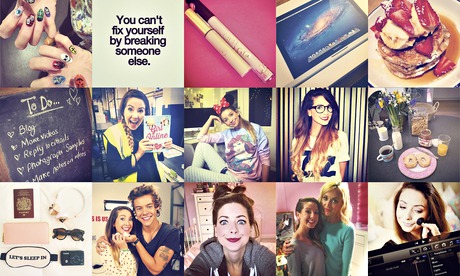There is a particular breed of middle-aged man that prides itself on not knowing who Kim Kardashian is. “What’s that?” they cry in comment sections throughout the land, “What’s a Kim Kardashian?”. This performative I’m-too-busy-with-books-to-even-turn-on-the-TV intelligence usually backfires immediately (you’re telling me you’ve read 10,000 books but can’t discern that “Kimberly” is a woman’s name?)
Pretending not to know who celebrities are to seem clever is likely an age-old phenomenon (Spartacus? Never heard of him) but thankfully, you no longer have to pretend. After makeup artist and YouTuber James Charles brought Birmingham to a standstill on Sunday – with traffic gridlocked as thousands of teenage fans flocked to see the 19-year-old at a shopping centre – many people are realising that they actually, genuinely haven’t the foggiest who 2019’s celebrities are.
It’s now easier than ever to be out of the loop. Charles has almost 14m subscribers on his beauty-based YouTube channel, making him firmly famous by any measure. Yet the reaction to his Birmingham appearance has been everything from confused to outwardly hostile.
“What a sad society we’ve turned into,” wrote one person in (where else but) a Facebook comment section, “Yes, people used to flock to get a glimpse of the Beatles, but the Beatles were writing amazing songs.” Another writes: “The world has definitely gone mad.” Sticking to the tried-and-tested theme, yet another adds: “You can’t compare it with the Beatles, different class.”
Let’s give it a go, shall we? In 2014, CBS reported that the Beatles have sold 1.6bn singles in the United States since the 60s – in just three years, James Charles has accumulated 1.1bn views on his YouTube channel. The Beatles’ hair (which was unusually long for the time) was mocked by adults in the press who considered it androgynous; Charles has been disparaged by the aforementioned internet commenters as a “boy in makeup”. Both are arguably revolutionary.
“Aha!” you twist and shout. “But the Beatles were talented!” Charles undeniably has talent (get back to me when you can do a rainbow cut crease) but it’s equally undeniable that there are now huge swathes of “talentless” YouTube celebrities who do nothing but talk to the camera about imagined internet drama. So the world has definitely gone mad, yeah? THIS IS THE END? Sure, if you ignore thousands of years of human history in which talentless idiots were celebrated with power, pounds, and prestige (for research purposes, start with nearly every royal ever).
Rather than getting angry at this new celebrity culture, we should accept it (at least in order to have the appropriate infrastructure in place for YouTubers’ public appearances). Of course, there’s no denying that it’s increasingly hard to keep up with our modern, silo-ed celebrities. Charles has more than 13 million subscribers, and so do Eleonora Maronese, Roi Fabito, Rachel Levin, Guillermo Díaz Ibañez, Wengie Huang, and Nathaniel Peterson. Who? There are now more celebrities than ever before. When Andy Warhol said we’d all have our 15 minutes of fame, I doubt he meant simultaneously.
And there are real repercussions for a celebrity culture that takes place almost in secret – not least, how can parents hope to monitor who is influencing their kids if they’ve never even heard of the influencer in question? One of Britain’s most well-known YouTubers, Zoella, was first covered in a BBC article in 2013 which called her “one of the UK’s most successful young vloggers” – at the time she had 2.5m subscribers. There are now 3,208 YouTubers who have more than 2.5m subscribers.
Things are changing so rapidly that it’s hard to keep up – but that doesn’t mean we shouldn’t. A year after the mainstream press introduced people to Zoella, her debut novel broke records and became the fastest-selling book of 2014, before it emerged it was written by a ghostwriter. This scandal allowed parents to show children the truth about online stars who pretend to be their best friends – it was an important teachable moment. And yet, naturally, the Guardian was disparaged by commenters at the time for writing “about a girl with a gloriously over-hyped book”.
Snarky comments don’t help anyone, and we should recognise ignorance of celebrity culture as being just that – ignorance. I’m not saying you need to memorise all 3,208 YouTubers with over 2.5m subscribers – but when a person you’ve never heard of brings Britain’s second-largest city to a standstill, maybe Google them before scrolling to the comment section to type “WHO???”.
• Amelia Tait is a journalist who writes about tech and internet phenomena











